Boris Johnson's controversial Northern Ireland legacy
- Published
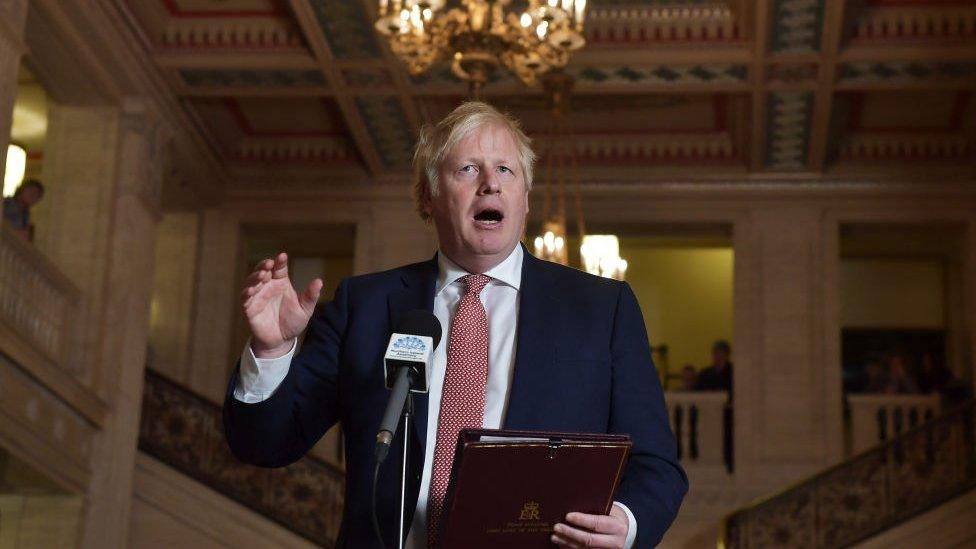
Boris Johnson visited Stormont in 2020
Boris Johnson's tenure in Number 10 began with stalemate at Stormont and it ends with one too.
His last visit to Northern Ireland in May saw him spend most of it holed up at Hillsborough Castle.
Inside, Stormont party leaders - frustrated at the government's handling of Northern Ireland issues - fired criticisms at him.
Outside, anti-Brexit protesters, Irish language campaigners and victims' groups gathered to call for his resignation.
It would take two more months before Mr Johnson would be forced out by the Conservative Party, nearly three years to the day after he first got the keys to Downing Street.
A prime minister who promised to "get Brexit done", he leaves office with the row over the Northern Ireland Protocol unresolved and Stormont without a government.
But his involvement with Northern Ireland wasn't always so fraught.
DUP fanbase
In 2016, when he was mayor of London, Mr Johnson visited Wrightbus in Ballymena, County Antrim, soaking up the spotlight as he posed for photos with his "Boris buses".
It was his support for Brexit that first led many in and outside his own party to see him as a statesman.
Among his fanbase, the Democratic Unionist Party (DUP), which put him centre stage of its party conference in November 2018.
He told the party that no British government "could or should" sign up to a post-Brexit border in the Irish Sea between Northern Ireland and the rest of the UK.
There would be no repeat reception the following year, once Mr Johnson had been installed as prime minister.
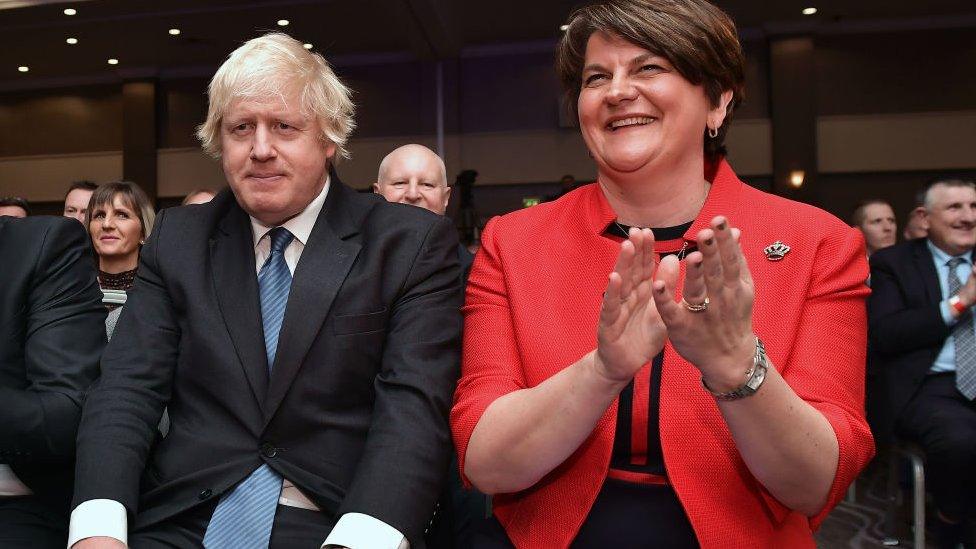
Boris Johnson, pictured with Arlene Foster, was the star guest at the DUP conference in 2018
When he took office, the Conservative Party lacked a majority in the House of Commons and had been relying on DUP votes to pass legislation.
It gave the DUP huge influence, which the party hoped would help secure a Brexit deal with which it would agree.
But Mr Johnson was stuck in the same Brexit bind as his predecessor Theresa May - unable to find a way to get a Brexit deal that he could pass through Parliament.
So in October 2019 he met directly with the taoiseach (Irish prime minister) at the time, Leo Varadkar, at Thornton Manor in north-west England.
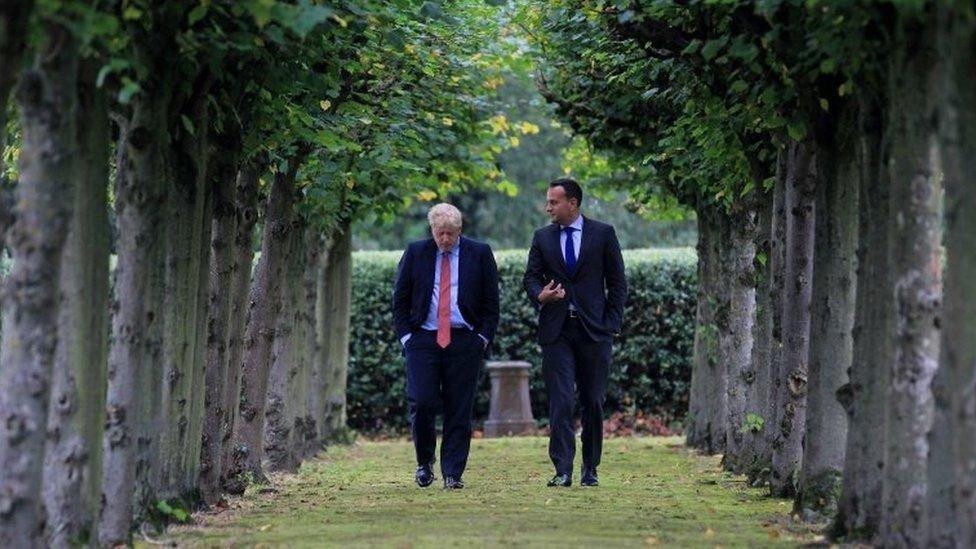
At the time, Leo Varadkar described the meeting with Boris Johnson as "positive"
The two men spoke for more than two hours, including a walk in the manor's grounds.
By the end of the meeting, the leaders said they could "see a pathway to a deal".
Ultimately, Mr Johnson signed up to the Irish Sea border as part of his deal with the EU - creating checks on goods travelling between Northern Ireland and the rest of the UK.
In the process, he wrecked his relationship with the DUP and earned himself a rebuke from its then leader Arlene Foster who said her party had sent him to the "naughty step in Parliament".
Boris Johnson "sent to the naughty step" twice by the DUP, says Arlene Foster
Unionist opposition was strident - the Orange Order described him as a "lousy unionist" and posters featuring his face and accusing him of passing a "betrayal act" appeared in some unionist parts of Belfast.
Despite this opposition, he ploughed ahead, taking the UK out of the EU in January 2020 after winning a general election the previous month, insisting his deal was "oven-ready".
He also denied that there would be a border in the Irish Sea, and called his Brexit deal "a good arrangement... with the minimum possible bureaucratic consequences".
When asked by a Northern Ireland businessman whether he could tell his staff that they wouldn't have to complete customs declarations for goods going from NI to GB, Mr Johnson said that if anyone asked them to do so, they should be told to contact him directly.
"I will direct them to throw that form in the bin," he said.
As well as marking the passing of his Brexit deal, January 2020 was a significant moment for Mr Johnson for another reason.
After talks between his Northern Ireland Secretary Julian Smith and the Irish Foreign Minister Simon Coveney, a deal was struck to restore devolved government at Stormont after a three-year hiatus.
That meant a visit to the home of the Northern Ireland Assembly was on the cards.
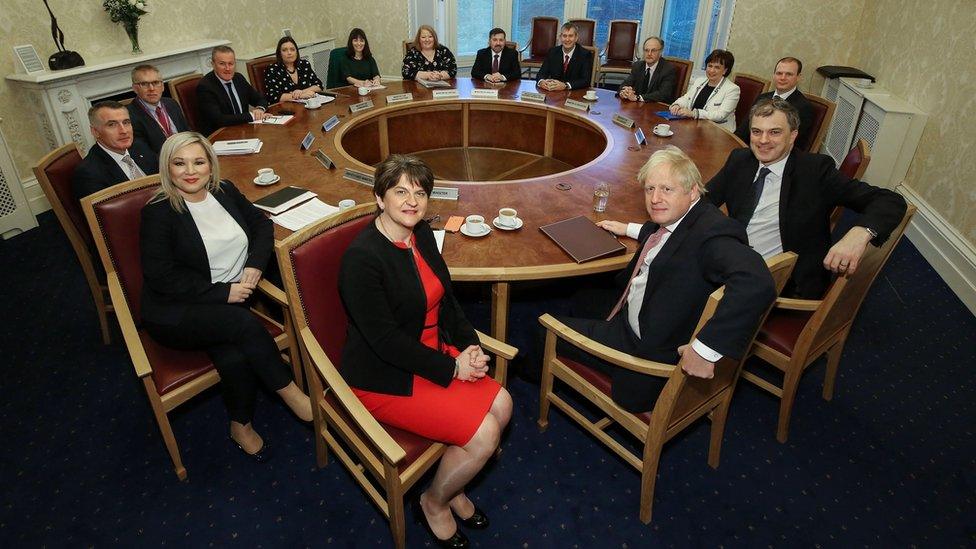
Boris Johnson met the new executive ministers at Stormont Castle in January 2020
But Mr Johnson didn't predict a pandemic in his future, with Covid upending all public and political norms - and the prime minister almost losing his life to the virus.
Many months later came the revelations that he and officials in Number 10 had broken Covid rules - holding wine and cheese parties while others stayed at home.
Dubbed partygate, it and controversy involving the MP (and former Northern Ireland secretary) Owen Paterson damaged support for Mr Johnson among Tory backbenchers.
Add to that the pressure piled on the prime minister to renegotiate the deal with the EU on the protocol, which led to him moving away from his earlier public statements about the Northern Ireland parts of the Brexit deal.
He pledged "fix not ditch" the protocol and by July 2021 issued proposals for change. In June 2022, he published a bill to alter it.
Those proposals were strongly criticised by non-unionist parties in Northern Ireland as well as the EU and opposition parties in the rest of the UK.
'Putinesque tactics'
Former Northern Ireland secretary Lord Hain accused Mr Johnson of "Putinesque tactics" and said he was using Northern Ireland to try to provoke a row with the EU.
Rows over the protocol led to the collapse of the Stormont institutions in February 2022, when the DUP First Minister Paul Givan resigned and the party vowed not to re-enter government until the protocol was changed.
That put the prime minister on a hard collision course with the EU, one which will remain in the in-tray of whoever his successor is.
Mr Johnson was also criticised by all the parties in Northern Ireland, as well as the Irish government and victims' groups, over a new law which aims to end prosecutions for alleged offences which occurred during the Troubles.
The bill offers a conditional amnesty to those accused of killings and other Troubles-related offences and despite the opposition in Northern Ireland, it passed the House of Commons at the start of July.
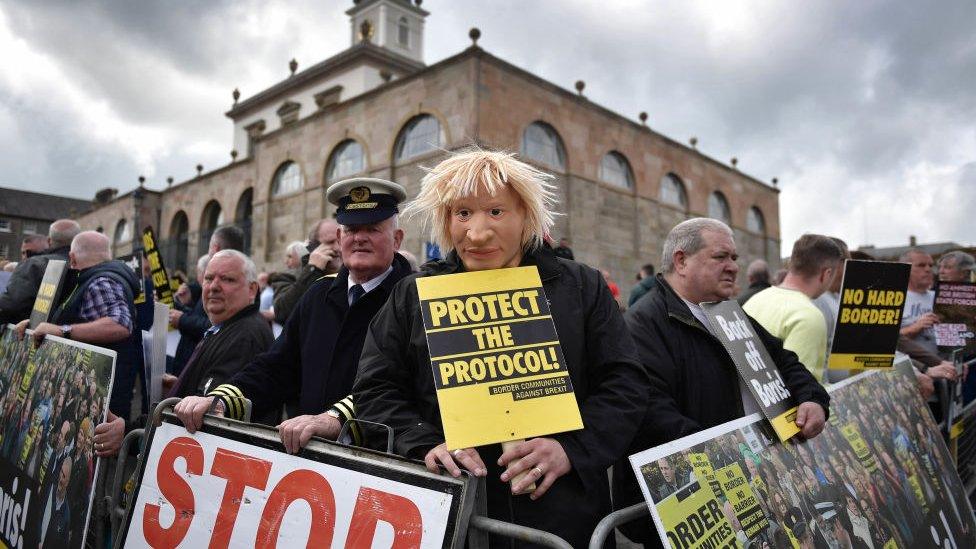
Protestors were out in force when Boris Johnson last visited Northern Ireland
Another plan which Mr Johnson leant his support to did not see the light of day.
A well-known fan of big infrastructure projects, he described a bridge between Northern Ireland and Scotland as "a very interesting proposal".
His government commissioned an official feasibility study, which received a mixed reception from parties in Northern Ireland.
In November 2021 the plans were officially ruled out due to forecasted costs and engineering challenges.
But what of Mr Johnson's overall legacy in Northern Ireland during his time in charge?
Faced with that question while marking the centenary of Northern Ireland's creation at a church service in October, he insisted Northern Ireland had a "great future".
But it's a future Mr Johnson will, for now, play no further part in.